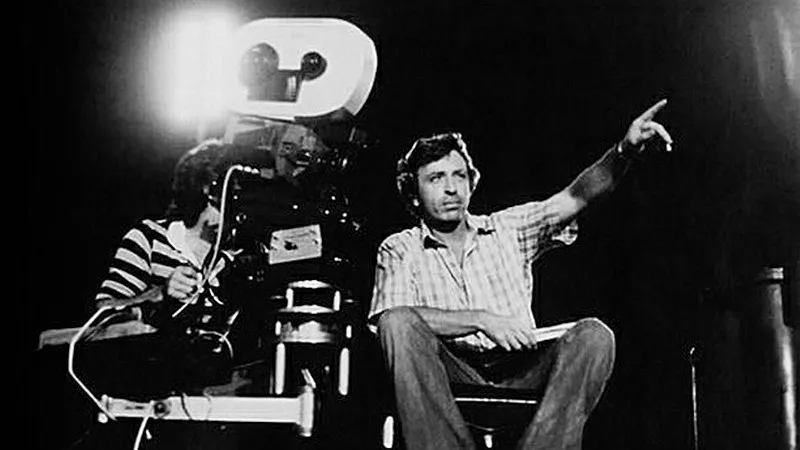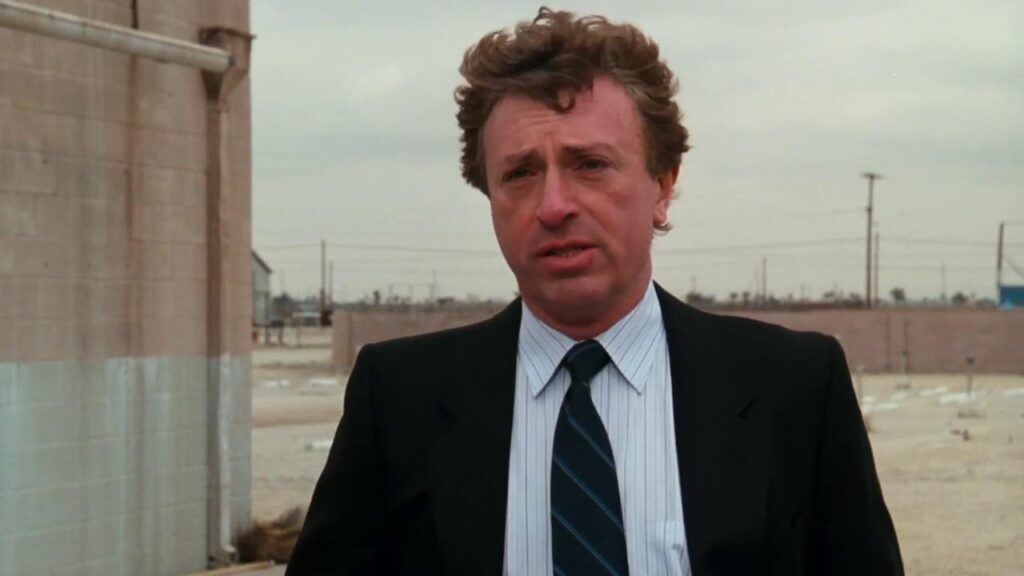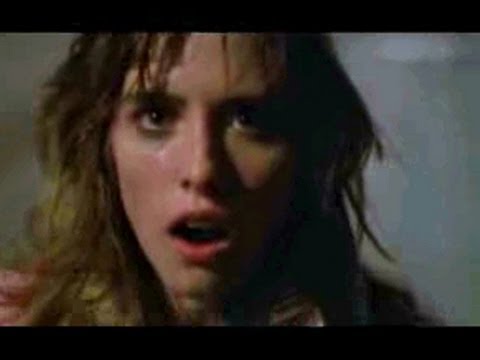If you were of school age in the early 90s and often found yourself sat in front of the telly in that weird interval between programming for kids and the news – disinterestedly absorbing everything from repeats of The Time Tunnel to Normski presenting Dance Energy – then chances are your first exposure to the work of the director and writer responsible for legendary horror and science fiction films like Q: The Winged Serpent, God Told Me To, It’s Alive and The Stuff happened without you realising it.
“David Vincent has seen them. For him it began one lost night, on a lonely country road looking for a shortcut he never found.
It began with a closed deserted diner, and a man too long without sleep to continue his journey.
It began with the landing of a craft from another galaxy…”
The Invaders was the creation of Larry Cohen, a TV writer who by 1967 already had a string of creator credits for shows including the western series Branded and, perhaps more pertinently considering the tone of The Invaders, the paranoid spy thriller Coronet Blue. An ‘aliens-live-among-us’ style plot inspired by Invasion Of The Body Snatchers, The Fugitive and Alfred Hitchcock, The Invaders radiated a dull grey fog of cold-war paranoia and had an atmosphere of gloomy unease that plays back decades later like the product of a vivid childhood dream. The show also neatly, and in a kid friendly manner, corralled most of the themes that would inspire its creator throughout his career – the inevitable collapse of authority, the inability of people to see the danger in front of them until it’s too late, and what happens when something ‘normal’ suddenly isn’t ‘normal’ anymore. Whether it’s alien invaders, the FBI or killer yoghurts, the threats to society in Larry Cohen films are all around you, you cannot see them and they mean you harm. Science fiction and horror of the post-war era suppurates paranoia and mistrust, but what sets Cohen apart is his deep scepticism, a cynical streak that married Jonathan Swift style satire with Catskills comedian smarts, and a run-and-gun approach to film making that miraculously never got anybody killed.
A New York-born Jewish kid, Larry Cohen became a prodigious writer early and sold his first screen play while working as a page at NBC in the 1950s. He had already amassed ten years of TV scriptwriting experience when he made his first feature, Bone, a heavily satirical comedy about American racial prejudice, in 1972. On the face of it Bone is an outlier in a filmography mostly defined by horror and science fiction, but thematically it is a precursor of what was to come. It was immediately clear that Cohen had things he wished to say from the get go, and that as soon as he was given full control of a project – he was Bone’s writer, director and producer – he would say them, comfortably. A home invasion thriller, of a sort, in which an upper middle class Los Angeles home is terrorised by a Black intruder posing as an exterminator, Bone, while occasionally giving in to the itchiness of its even-then uncomfortable premise, manages be an exercise in constant subversion, never taking the obvious route on its way to sensitively and damningly depicting a trio of people whose lives have been bled of meaning by society’s expectations of them. The titular home invader, as played by Yaphet Kotto, is someone who seems to know exactly what kind of role he has been allotted and is deeply resentful because of it. A mordantly funny reflection of the situation for young Black men at the time, it may have been but most of all Bone is a film about what happens when a random event turns a group of people’s lives upside down, and the cracks and fault lines that are exposed in wider society as a result.
Following a lucrative dip into the waters of blaxploitation with Black Caesar and Hell Up In Harlem (both 1973), Cohen made two films, one sci-fi (God Told Me To) and one horror (It’s Alive), which exhibited a ripped-from-the-headlines immediacy that would typify Cohen’s films for the rest of his career. In both of these cases it was the theme of the American man in freefall that resonated. From Andrew Duggan’s bankrupt car salesman in Bone, to Lieutenant Peter Nicholas in 1976’s God Told Me To, Cohen continually exhibits fascination with men struggling at the end of their ropes as their long-held certainties crumble around them. It’s hard not to feel sorry for Frank (played by John P. Ryan) in 1974’s It’s Alive. Who wouldn’t sympathise with someone whose wife has just given birth to a giant cannibalistic baby? But his reaction is instant, uncomprehending blame which swiftly mutates into uncomprehending violence. Lieutenant Nicholas (Tony Lo Bianco) in God Told Me To is a more complicated character. A cop whose faith in both his religion and his professional ability is being repeatedly tested as a string of murder suicides rock New York City, it’s when his status as a man is challenged that he finally loses the plot. Although again we should probably be sympathetic within reason to someone who’s been asked to mate with their own extraterrestrial half-brother via a vaginal appendage in his side.

In these early films the main target of Cohen’s satirical bite is the crushed male ego, but it was Michael Moriarty’s performance in 1982’s Q –The Winged Serpent that pushed the director’s handling of the theme to a more complex, society-straddling level. A giant monster movie concerning a winged Aztec deity living at the top of the Chrysler Building, Moriarty’s blazingly eccentric but always plausible performance as Jimmy Quinn, a low-life con and struggling hustler who accidentally lucks onto the monster’s hiding place, elevates Q to pulp greatness, as well as being the debut of one of the most electrifying director/actor partnerships in genre cinema. A man blind to the fact that his constant bad luck might have something to do with him being a raging asshole, it’s to Moriarty and Cohen’s credit that they never try to make Quinn likeable. But what’s noticeable is Cohen’s developing interest in how society is changed for the worse by such small angry men. Cohen follows Quinn from downtown dive bars to the mayor’s office, never letting the audience lose sight of the fact that he’s a loser who blindly stumbled upon a shaky way to get to the top and is grabbing onto it with both hands. By the end of the film his selfishness has caused mass panic, got him incarcerated, pushed his endlessly sympathetic girlfriend away (“I saw you when you had some power, it wasn’t pretty”), and created a circumstance in which an awful lot of people got eaten by a big flying lizard.
Q is also the first film of Cohen’s where it feels as if his shotgun blast approach to satire is a result of his somewhat elastic filming process. The director was celebrated for his ability to make up scenes on the fly if a particular circumstance presented itself. In Q one of the central subplots, that Quinn has turned to crime and addiction following a failed musical career, was only written into the film after Cohen found out that Moriarty could play the piano. The director cancelled the next day’s shooting, hired a piano bar and wrote an entirely new scene for his actor, developing the character in a way that gives the film immeasurably more depth. More depth than your average flick in which a giant winged monster attacks New York anyway. These “let’s get it in the movie!” impulses extended to location as well. Cohen was notorious for stealing shots – i.e. shooting in places where he didn’t have permission – a practice that led to him scaring the shit out of passersby when blank machine gun rounds started raining from the top of the Chrysler building during the shooting of Q, and, most notoriously, for infiltrating the Saint Patrick’s Day parade with a pre-fame Andy Kaufman dressed in a police uniform and waving around a prop gun for God Told Me To, a bold move that very nearly started a riot, all of which ended up in the film. Shot using hidden cameras, the New York street scenes in both films have an edge that makes them feel like truly dangerous pieces of cinema. Watching actual New Yorkers reacting as wounded and dying bit part characters collapse on the pavement in front of them gives the films an unpredictability that’s in keeping with their wider themes of societal disruption. Cohen again asking us to look at what normal people do when the unthinkable happens.
All this being said, Cohen’s are not necessarily the movies aspiring directors might want to check out for stylistic tips. Despite long years in production, and shadowing Alfred Hitchcock while The Master filmed North By Northwest (the young and uninvited New Yorker sneaked onto set every morning) Larry Cohen is not what one would call a film maker’s film maker. Some of his work is borderline shoddy, giving the impression of having been edited with a meat cleaver, and this bagginess, however refreshing compared to more polished Hollywood product, isn’t always to the finished film’s credit. It’s this loose approach that’s responsible for the glorious failure of perhaps the last truly noteable movie Cohen directed, 1985’s The Stuff.
If you know anything about The Stuff then you know that it is a movie about a killer yoghurt. If you have actually seen The Stuff you know that it is a movie about a killer yoghurt from the centre of the earth that also happens to be a damning criticism of nearly every facet of Western culture (excuse the pun). In their second major collaboration Moriarty plays David ‘Mo’ Rutherford, a man cut from a different cloth than Cohen’s usual cohort of down on their luck schlubs. Cocksure, confident and almost unbearably smug, it’s a testament to Moriarty’s skills that he’s capable of making this Texan FBI agent-turned-industrial-saboteur fascinating rather than repellent. Hired by a rival dessert company (“I suppose we do have to keep the world safe for ice cream”) and charged with investigating the massive success of a gloopy marshmallow-like confectionary marketed as ‘The Stuff’. Moriarty’s investigations lead him on a Rabelaisian tour of American social degradation, one which stops to pour scorn on the advertising industry, the food and health authority, junk food manufacturers, drug companies, the military and the American family unit. Probably the only reason the church was saved the director’s ire is because he couldn’t find a cheap one to shoot in. It’s a glorious mess of a film, edited and constructed with a shocking lack of panache but with a paucity of concern for anything resembling social decency that approaches the heroic. By the climax of the film, where the end of the world via sentient pudding has been averted (or has it?) due to a radio broadcast by some extremely dubious militia men, the proceedings have the madcap quality of Jack Davis’ grotesque illustrations for Mad magazine. A pinwheeling collection of numbnuts and wallies, face down with their trousers round their ankles trying and failing to save the world. Cohen’s message is pretty clear: The solution is just as bad as the problem. Abandon hope all ye who enter here. And yet, for all the despair, Cohen never seems to be especially angry. His is the satirical instinct of the holiday resort comic. A “Hey, what are ya gonna do?” shrug, rather than a roar of anger. A shaking of the head at the absurdity of society’s never ending rabble of competing idiots.
“If I could have retained control of the pictures without trying to direct them, I think I would have just written them and let somebody else direct.” Cohen admitted later in his life. It’s a statement borne out by his occasionally slapdash approach. Being on set is clearly what Cohen loved, flexing his on-the-spot improvisational prowess, borne from his days as a live TV scriptwriter and stand-up comic. If that meant the final product could be a bit wonky; well, so be it. He had moved onto the next one before anyone really noticed anyway. So, it’s maybe appropriate that the last of his great social satires (or, more accurately, his last two great social satires) were directed by someone else.
Maniac Cop and its sequel Maniac Cop 2, directed by Bill Lustig and written by Larry Cohen post one of the latter’s classic questions: “What if a cop started killing people?” This gambit was then chained to the steering wheel of the late eighties action/horror movie format, complete with gun battles, men running around on fire, and stunts that make you involuntarily draw your knees up to your face in naked terror. But amongst all that excitement it’s still asking the question that Cohen finds most compelling: what happens to a society when authority fails? And what does it say about us that we need that authority in the first place? Titular antagonist, undead cop Matt Cordell is a man turned monstrous by working for a system that doesn’t care about him. Despite years of unstinting service, he’s framed, murdered and left to take the rap for a crime he didn’t commit. It’s hard to tell whether his response is commensurate or not, given how precedent-free the idea of a police officer rising from the grave to put on his uniform and become a serial killer is. Cohen instead is consistent in indicting the corrupted cultural systems that make these monsters and what effect they in turn have on the world around them. When trust breaks down and the people we look to in order protect us are revealed to be shallow uncaring savages, what then? Cohen’s answer is simple: we have to laugh. It’s a joke that seems even more wearingly familiar now than it must have done back then.





